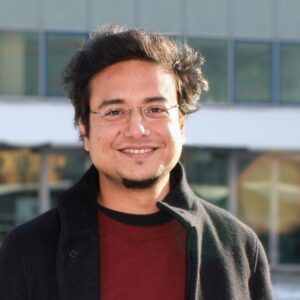Pallab Kumar Borah’s Interview
Starting date: 1.02.2024
Nationality : Indian
Implementing Partner : Technical University of Munich
Main supervisor: Dr Christopher Garvey

Few words about you and your research project
I am Dr. Pallab Kumar Borah, a researcher based at the Research Neutron Source at Technical University of Munich in Germany, as part of the GNeuS MSCA COFUND program.
My research lies at the interface of food science, scattering, and molecular dynamics, aiming to uncover the mechanisms and governing principles of polysaccharide chain hydration and conformation. Specifically, my current project aims to utilise neutron scattering and spectroscopy to directly measure hydration around polysaccharide chains and relate it to the chain’s conformational dynamics.
Why is it important? Polysaccharide polymer chains display a diverse set of conformational states, which results in complex viscoelastic behaviour of their solutions. Understanding the origins of polysaccharide conformation and viscoelasticity will broaden the current understanding of polymer physics and lay the foundations for next-gen biomaterial engineering.
Two secondments broaden the scientific outreach. An academic secondment is planned at the University of Nottingham in the UK, and an industrial secondment is planned at Heura Foods in Spain. In the latter, fundamental science will meet application research to leverage hydration-informed polysaccharide conformations and enable the creation of long-lived viscoelastic filaments to develop fibre spinning technologies to unlock new textures in foods and sustainable biomaterials.
To know more about my research, please follow the link!
What is your background? How have you heard about GNeuS?
I earned my PhD from Tezpur University in India with a split-site placement at the University of Leeds in the UK, where I studied food biopolymer self-assembly using small-angle scattering, rheology, and molecular dynamics simulations. After graduating, I joined the University of Nottingham as an industry-funded Postdoc, focusing on advanced processing of biopolymers to create anisotropic food microstructures. My work during this time on hydration of polysaccharides inspired my GNeuS fellowship proposal.
I first heard about the GNeuS programme through my Nottingham Line manager, whose links with my current supervisor at TUM opened the door to this opportunity.
Why did you apply specifically on GNeuS?
My decision to apply to the Global Neutron Scientists programme is driven by two interconnected motivations.
Firstly, GNeuS offers hands-on access to world-leading neutron instrumentation at TUM, JCNS and partner large-scale facilities across the globe, giving my project the needed wide resolution coverage for success. Secondly, GNeuS also couples this experimental excellence with an interdisciplinary and intersectoral training ecosystem, alongside emphasises on open science, mobility, and societal impact. These values resonate with my commitment for scientific excellence to build healthier, sustainable societies.
Professionally, GNeuS offers the perfect springboard for my research vision and long-term career. The programme’s framework provides structured secondments, collaborations, teaching and supervision opportunities, and networking opportunities within an individually tailored career plan. This positions me to build the interdisciplinary, international profile expected of a future academic in neutrons-enabled food physics research.
What impacts do you expect from the GNeuS fellowship?
The academic impact of my fellowship will deepen the fundamental and applied understanding of polysaccharide chain conformation based on solvent quality and hydration. The innovative concepts are expected to cross-pollinate into disciplines such as polymer physics, food physics, and soft matter. In the longer-term, discoveries made in my project could potentially allow me to establish a new research field in ‘polysaccharide folding’; the latter is currently considered to be a constrained stochastic process.
As part of TUM research-led teaching, novel findings are already being included in the taught and research courses to inspire next-generation scientists.
From an industrial standpoint, the development of fibre spinning technologies will lay the foundations for novel food and biomaterial structuring methods with applications in plant-based meat analogues, biomaterial scaffolds, and advanced biomaterial 3D printing.
